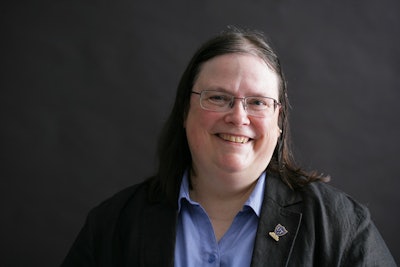The halls of higher education already had a leaky pipeline for women in science and academia, but the coronavirus pandemic has taken an ax to the problem and busted it wide open.
Working moms across the country have reached a breaking point – a shocking 617,000 women quit the workforce in September alone.
In colleges and universities, as in other workplaces, we are on the cusp of what has been called a female recession after professional careers and parental duties merged during COVID-19 lockdowns and homeschooling.
Women are falling behind on research – derailing critical progress on achieving tenure and promotion within the seven-year deadline – especially in three main research areas: health and medicine, physical sciences and engineering, and social science and economics.
 Dr. Karen Bjorkman
Dr. Karen BjorkmanBefore the damage to diversity is beyond repair, institutions must act immediately to provide flexibility for rising academic women who are facing career-ending setbacks.
At The University of Toledo, we are offering a one-year tenure clock extension to all junior faculty no matter what year they are in their tenure process. It’s the right thing to do. While not specifically aimed at women, we know that women are largely experiencing the brunt of childcare and caregiving for aging parents.
There are only 24 hours in a day. We have to use our time wisely, maintain our own self-care, and guard against burnout. That means understanding that people are not going to be as productive as this period continues with no real end in sight.
Pausing the tenure clock takes the worry of immediate research output off their shoulders.
Remember, there are already fewer people to teach classes given budget issues facing colleges and universities across the country. Faculty members are teaching more classes at the same time that we’re asking them to teach the same class in three different modes: face-to-face, online and recording it so it’s available for a student in quarantine.
Some people are reluctant to talk about this because they feel at fault for not juggling it all. That’s absolutely not the case. Being a tenure-track faculty member and trying to achieve work-life balance is a struggle even when we’re not in a global pandemic. As a woman, astronomer and provost with a long career dedicated to science and education, I’ve made it a priority to ask questions and create a safe space for these conversations.
I can feel their stress over Webex as they talk about having four people in the house: two adults working from home, two kids trying to take their school classes remotely. The wi-fi doesn’t have enough bandwidth. The adults have to learn math again to help their children.
Personally, I don’t have children, so I haven’t faced the same issues. But I had other issues to navigate.
One thing I know for sure is that these hard-working women need the time back that was taken away by this pandemic to get caught up or they’re going to consider abandoning their careers in academic research and higher education altogether.
We had three women win science Nobel Prizes this year. But where will the future women science leaders come from if we lose a generation because of the incredible demands placed on them during the pandemic? Despite progress that has been made, science is still a male-dominated field. Girls in elementary, middle and high school need female role models to look up to. They can’t disappear.
By adding time to the tenure clock, we are not lowering the standard. We’re giving working women and men under incredible pressure the time and space needed to get through this and let them back in the door when they’re ready to take that step. We’re creating a path for them to return to their research.
I had a conversation with a graduate student who just had a baby and was finishing her Ph.D. She had made the decision to leave the field and apply her skills elsewhere even though she loved doing the research. It hurt her tremendously to make that choice because she knows there often isn’t a door to come back in once you go out.
As one in four women are considering leaving the workforce or downshifting careers because of COVID-19, we’re facing a reality of decades of women’s progress being wiped out in a single year.
Losing a few months of research doesn’t sound like much, but it’s a very big deal for a tenure-track faculty member. They’re not in the lab getting results, using those results to write grant proposals to get funding to grow the research project, publishing papers or speaking at conferences. If that progress stops, it becomes harder to show how you’re making an impact in your field.
Adding an additional year to earn tenure is the way to lead with a family-friendly heart during a global health crisis and help rising stars succeed in their dream of a life-long career and academic freedom.
We rolled out our one-year tenure clock extension at UToledo shortly after we went into shutdown back in March. We initially had a flood of requests, but it slowed to a trickle, then dried up. The hope was that we’d be fine by fall. When we announced the teaching plan for this semester, another batch of requests came in.
Requests are already surging again going into the winter since we will again need to use the same teaching modes in spring 2021, and folks are realizing how much they’re falling behind on their research. The option is still available. I hope those who need it take us up on it.
Though it may seem like applying duct tape to stem the leaks right now, this extension could be the lifeline to save promising, inspiring careers for women in science and leadership.
Dr. Karen Bjorkman is provost and executive vice president of academic affairs at The University of Toledo and Distinguished University Professor of astronomy.



















